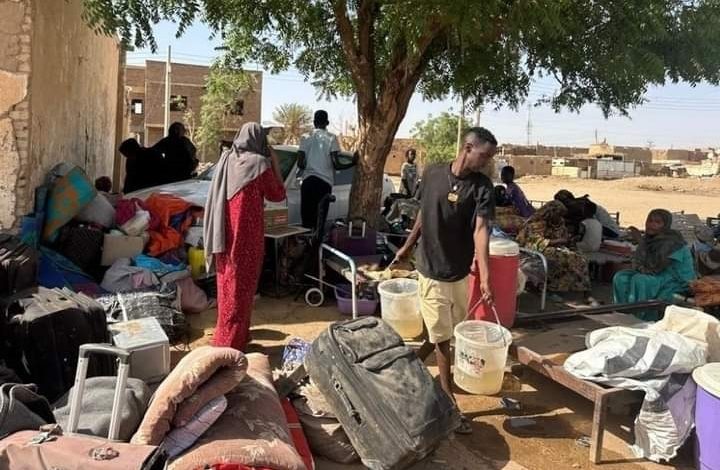Sudan’s Displaced People.. From the Hell of the Militia to the Maze of Floods and Rain

Sudan Events – Abdul Basit Idris
Suffering of the displaced who fled the hell of the Rapid Support RSF Militia’s violations to the safe states continues as floods and rains swept through those areas and swept away many homes, markets and shelters, leaving severe environmental and humanitarian damage to the Sudanese who were beset by hardships in the year of grief.
Victims and Destruction:
The latest official statistics indicate the death of (45) people in the River Nile and Northern States due to floods and rains. This statistic was preceded by what the Federal Emergency Operations Center reported in its latest update in the middle of the week that 32 people were killed, affirming that 5,575 homes were damaged by floods and rains. Across the country.
At a time when the Meteorological Authority expected more heavy rains and floods in the coming days.
Gedarif and Kassala:
The displaced people IDPs in Gedarif State are considered the most affected by the rainfall, as the water flooded the temporary shelters and swept away the tents of the IDPs who were surrounded by water from all sides and left them in a state of continuous search for dry land to save them from the roaring waves.
Gedarif witnessed the reception of about 200,000 new displaced people since the Rapid Support RSF Militia invaded the cities and villages of Sennar State.
The local authorities announced a large gap in food and medicine between what is available in the state and the huge numbers of displaced people affected by the floods.
In Kassala State, which hosts tens of thousands of displaced people, the situation has become worse after floods flooded three of the largest shelters in the state, and the situation has gone beyond the capacity of the state authorities, who were unable to provide new places for the displaced and treat emergency cases.
A few number of gold traders in the state announced their donation of about SDGs 18 million as an emergency response to feed the displaced, while the civil defense authorities sent a convoy of shelter materials for the displaced and reinforcements to confront the dangers of autumn.
Darfur is another tragedy:
In El Geneina, West Darfur State, which witnessed the most heinous types of genocide and ethnic cleansing of the Masalit tribe by the Rapid Support RSF Militia, which led to the killing of 5,000 people and the flight of 8,000 others, Wadi Kaja swept through the city, which became empty of its residents after it was seized by new settlers from families brought by the militias to El Geneina. The flooding of the valley led to the complete and partial destruction of hundreds of homes of the displaced indigenous population, and swept away occupied shops and markets, and the valley floods cut off the road linking El Geneina to the city of Zalingei, the capital of Central Darfur State.
As for South Darfur State, which is controlled by the militia, it witnessed floods and rains that caused severe damage to the Kalma camp for the displaced and led to the destruction of 200 homes.
City of Gold:
In the Northern and River Nile states, the situation seemed worse, as the two states received hundreds of thousands of displaced people who came to settle with their families after being displaced from Khartoum and other states, as River Nile State witnessed heavy rains and floods that swept through the city of gold, Abu Hamad.
The government spokesperson ‘platform said that the number of victims of the rains and floods in the city of Abu Hamad in River Nile State rose to (18) deaths, in addition to more than (80) injuries and (6) missing persons.
The areas of Karima, Halfa and the villages of Al-Mahas in Al-Shakalia also witnessed rains and floods that caused great damage to citizens’ homes.
These disasters reflect the suffering of the displaced and their families and have had a major impact on them and the cities to which they have been displaced, in light of the high cost of living and the lack of job opportunities in the fall, addition to the scarcity of medicines, the decline in medical services, and the weak response of hospitals and health centers in safe states in light of the increasing pressure on them.
Women and children are also considered the most affected by the ongoing waves of displacement and their health consequences.
The Federal Ministry of Health has sent an appeal to regional and international partners to work together to save children and pregnant women who suffer from malnutrition. The ministry said that cases have risen to 4.9 million this year.



